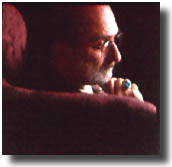 |

Prolific
"fox" of a scholar asks why nose jobs, not toe jobs...among
other things
When asked
to explain the disparate nature of his studies, Sander L. Gilman,
the Henry R. Luce professor of the liberal arts in human biology
and chair of the Germanic studies department, evokes Tolstoy: “He
said people are either hedgehogs or foxes. Hedgehogs ball around
and hold onto one idea, while foxes run from one to another. Well,
I’m a fox.”
Gilman’s research
darts from Kafka to AIDS to Freud. He holds additional academic
appointments at Chicago in comparative literature and psychiatry,
and he’s a member of the University’s Morris Fishbein Center for
the History of Science and Medicine, the Committee on Jewish Studies,
and the Committee on History of Culture. The phone rings and he
jumps from his discussion of Jeffersonian ideals into a conversation—in
German—about an upcoming Vienna conference on issues affecting Jewish
museums. Later, as he talks about German expressionism, a bright
turquoise ring—bought in Santa Fe, New Mexico, a favorite opera
venue—flashes on his right hand.
Such contrasts
can be explained, in part, by his diverse background. Born in New
York to Polish-Jewish immigrants—a truck driver and a homemaker—Gilman
was raised in New Orleans, where he earned a Ph.D. in German from
Tulane, later returning to the Northeast as a professor at Cornell
before joining the Chicago faculty in 1994. The author or editor
of more than 50 books, Gilman has just completed two volumes on
the history and psychology of cosmetic surgery, a topic he chose
because of the questions it raises about how people view themselves
and others.
“I’m not someone
who’s going to spend 30 years on one project,” says Gilman. “But
my work always comes back to questions about how human beings organize
the world and how we create images of those we are not—of the enemy,
of the other. And I’m doing what I’m doing because I’m a teacher;
I’ve always seen that as central.”
In Written
on the Body: A Cultural History of Aesthetic Surgery, to be
published early next year by Princeton, Gilman details the history
of cosmetic surgery. Departing from his typical approach of delving
straight into an interpretation of cultural behaviors, he saves
his analytical treatment of the practice for a second book, Creating
Beauty to Cure the Mind, to be published next spring by Duke. He
de-cided to address the two issues separately when he realized that,
on the one hand, he was interested in the “materiality of the body,
the physical nature of the body,” and, on the other, he wanted to
explore why aesthetic surgery “works and doesn’t work in terms of
making someone happy.”
Written
on the Body presents aesthetic surgery as a worldwide phenomenon
whose popularity has ebbed and flowed according to the tastes and
attitudes of particular historical periods. The book walks the reader
through the full range of aesthetic surgeries practiced since they
began as religious rites in ancient India, explaining, says Gilman,
“what gets cut, what gets chiseled, who’s the first doctor to do
a procedure, and what it looks like.” For example, he describes
how in 1894 Berlin surgeon Jacques Joseph developed the first face-altering
procedures, primarily in response to German Jews who wanted to reduce
the size of their noses to avoid being stereotyped as cold and mercantilist.
At about the same time, Gilman notes, some people in Japan began
to undergo eyelid surgery, as they increasingly viewed single eyelids
as dull and lacking life compared to those of Westerners.
In Creating
Beauty, Gilman fleshes out his historical chronology, asking,
“Why did operations that dealt with certain parts—the nose, the
ears, the face, the breasts—develop when, though they could do it,
no one developed an operation for the extension of the pinkie or
for a foot where all the toes are the same length?” For the answer,
he turns to the observations of 20th-century clinical psychologists,
psychoanalysts, social workers, and religious and feminist leaders.
Rather than inquiring why a particular person chooses a certain
surgery, Gilman primarily looks at why some procedures have been
performed more frequently in one population than in another. For
example, he notes that ear tucks have been more popular in Ireland
than in other countries because ears that stick out have been—in
English eyes—a sign of the degenerate Irish body and soul. Gilman
broadly concludes that individuals pursue aesthetic surgery in an
effort to “pass,” which he defines as “becoming invisible in a group
with which you want to identify.” This desire to pass, he explains,
may spring from an inferiority complex or from cognitive dissonance,
which occurs when a person makes inappropriate associations, such
as assuming that a nose job will necessarily result in overall feelings
of self-worth.
“There are
certain global criteria for appearance and beauty that are present
in the decision to have surgery, but they come with very specific
local nuances,” says Gilman. “You will get different answers in
Tel Aviv than in Rio de Janeiro. What I learned is that decisions
to have aesthetic surgery performed have to be understood as part
of a basic human desire to feel part of a physical cohort.”
This summer,
Gilman is embarking on another, more personal project, and his first
biography: a portrait of the late Jurek Becker, author of Jacob
the Liar, one of the first major novels about the Holocaust written
by someone living in Germany. “He’s someone who easily could have
been my double in complicated ways,” Gilman says of his close friend
and role model. Like Gilman, Becker was the son of Polish Jews,
but his family stayed in Poland. During World War II, the family
was separated; Becker’s mother died at Ravensbrueck, a Nazi death
camp, and it was only after the war that Becker’s father found him
in a Red Cross orphanage. Raised as a member of the Communist Party
in East Germany, Becker published Jacob in 1968 and began actively
opposing Communist rule in 1976. He then was exiled to West Germany,
where he became a popular screen and television writer and an articulate
voice in the quest for Jewish identity in postwar Germany. He died
last year of esophageal cancer.
“We all write
autobiography, at least in the humanities and social sciences, about
who we are or about what is apart from who we are,” notes Gilman.
“It all comes back to that Tolstoy quote. I have no problem reconciling
my interests because, like a fox, I enjoy each experience as I have
it.”—C.S.
|



